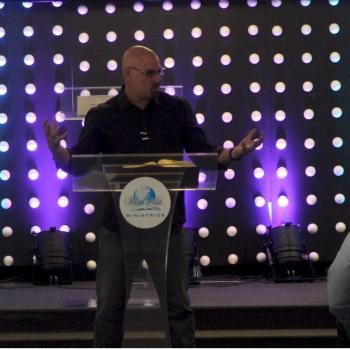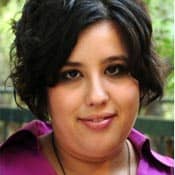Moses and the seventy elders chosen to lead the people go into the desert. There, the elders surround the sacred Tent of Meeting and God comes down to them in a cloud. God rests the divine spirit on the elders. They know God's immediate presence for the briefest of moments but never again.
When returning to the camp, Moses and his successor, Joshua the son of Nun, learn of Eldad and Medad. Eldad and Medad had been selected to be amongst the seventy elders about whom it "had been written," but they did not go out to the Tent of Meeting with the other elders. Eldad and Medad remained in the camp. The divine spirit rested upon them and they prophesied (Num. 11:26).
Joshua said to Moses, "Incarcerate them" (Num. 11:28).
Moses responded, "Are you being jealous for my sake? Would that the entire people of God could be prophets if God would but place the divine spirit upon them."
This short episode in Beha'alotcha is all we ever hear of Eldad and Medad.
The Talmud attempts to answer the underlying question in this story: If Eldad and Medad were a part of the seventy elders, why did they not go into the desert with them? To answer the question of why they were left behind, we need to ask how the seventy elders were chosen in the first place.
Rashi (1040-1105), a medieval commentator, answers by explaining what the text means by it "had been written." According to Rashi, Moses conducted a lottery to select the seventy elders. First, he selected twelve leaders from each tribe or seventy-two in total according to his knowledge of their character. To narrow down further, he wrote "elder" on seventy lots and left two blank. To the men who picked a blank lot, Moses said, "God does not want you."
The Talmud understands Eldad and Medad to be among those that God wanted; nevertheless, they decided not to participate in the lottery process, presumably undermining the need for the lottery all together (Sanhadrin 17a). Two answers are given for why they didn't participate: 1) Eldad and Medad feared rejection; they did not wish to be publically declared unwanted by God; 2) Eldad and Medad were too humble to presume themselves worthy of prophecy. Either way, for fear of not being picked, they did not play the game.
There are at least two other possibilities, which are not attested to in the tradition: 1) Eldad and Medad did not wish to be part of the official governing structure; they preferred to remain independent, prophesying on the fringes; 2) They were not chosen in the lottery; they were the ones "unwanted by God." Arguably, these two answers are more likely. The odds of winning the lottery were too good not to play and these men were leaders already, used to honor, or they would not be selected amongst the seventy-two. The unattested possibilities suggest that those who chose the fringes of normative society or are pushed to the fringes can still be the recipients of the divine spirit. Because this understanding of God does not fit comfortably into a hierarchal society, the Talmud suggested explanations that minimized Eldad and Medad's rebellion. In the text, however, it is apparent that Eldad and Medad's unauthorized prophecy is a subversive act, given that Joshua wants to incarcerate them.
Moses, on the other hand, unequivocally supports the dangerous and destabilizing assumption that the divine spirit can rest wherever it pleases and anyone amongst us can experience prophecy. Moses allows for the possibility that truth will speak to power and that power will listen. The contemporary origins of the phrase "speak truth to power" is unsurprisingly from the Quakers, who are perhaps the only non-hierarchical religious movement where it is believed that the divine spirit rests on every community member.
Later in this week's portion, Miriam and Aaron, Moses' brother and sister, challenge the distribution of prophecy within the community. Yet, unlike Eldad and Medad who are given the gift of prophecy, their challenge leads to Miriam's exile from the Israelite camp for seven days.
Miriam and Aaron say, "Was it only with Moses that God speak? Did God not speak with us as well?" (Num. 12:3)
God commands Moses, Miriam, and Aaron to go out of the camp to the Tent of Meeting. There God descends in a cloud.
God says, "Please hear my words. If there shall be a prophet among you, in a vision shall I make Myself, God, known to him; in a dream shall I speak with him. Not so with my servant Moses. In my entire house he is trusted. Mouth to Mouth do I speak to him, in a vision and not in riddles and at the image of God does he gaze"(Num. 12:6-8).
Miriam and Aaron, unlike Eldad and Medad, pose a direct challenge to the existent order. While Eldad and Medad are on the fringes, Miriam and Aaron are in direct line of authority. After experimenting with the possibility of universal prophecy, when the challenge to hierarchal authority comes from inside the establishment, where the challenge may actual succeed, the experiment ends. Aaron, who participates along with Miriam, is allowed to remain in the camp. But Miriam, understood as the instigator, spends seven days outside the camp for daring to suggest that she, a woman, can have a relationship with a God that equals that of Moses.
The text affirms that even before God we are not all equal, and yet the hint of an egalitarian vision continues. This portion is read around the time of Shavuot, the holiday during which, according to the Midrash, the Torah was given directly by God to us all—the souls of the past, present, and future. At least then we were all prophets.
6/7/2011 4:00:00 AM





